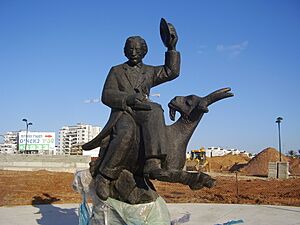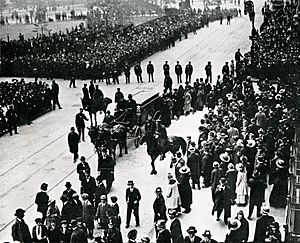Sholem Aleichem facts for kids
Quick facts for kids
Sholem Aleichem
|
|
|---|---|
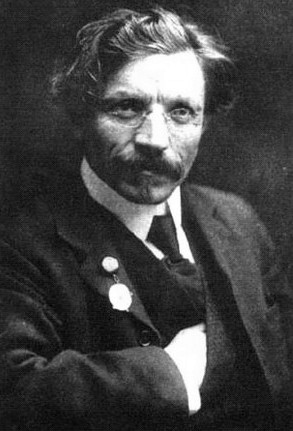
Sholem Aleichem, 1907
|
|
| Born | Solomon-Oleksii Naumovich Rabinovich March 2 [O.S. February 18] 1859 Pereiaslav, Russian Empire |
| Died | May 13, 1916 (aged 57) New York City, U.S. |
| Pen name | Sholem Aleichem (שלום עליכם) |
| Occupation | Writer |
| Language | Yiddish |
| Genre | Novels, short stories, plays |
| Literary movement | Yiddish revival |
| Signature | |
 |
|
Solomon Naumovich Rabinovich was a famous writer and playwright. He is better known by his pen name, Sholem Aleichem. He wrote in Yiddish, a language spoken by many Jewish people in Eastern Europe. Sholem Aleichem lived in the Russian Empire and later in the United States. He is most famous for his stories about Tevye the Dairyman, which inspired the musical Fiddler on the Roof. This musical was one of the first successful English plays about Jewish life in Eastern Europe.
The name "Sholem Aleichem" comes from a Hebrew phrase that means "Peace be upon you!" It's a traditional greeting in Hebrew and Yiddish.
Contents
Early Life and Education
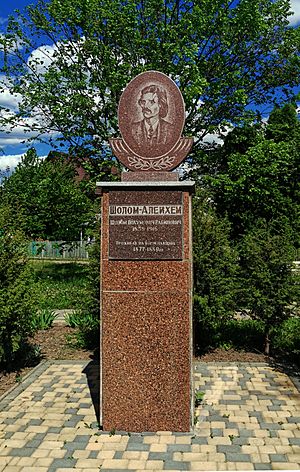
Solomon Rabinovich was born in 1859 in a town called Pereiaslav. He grew up in a small village nearby, which he later used as a model for his fictional town of Kasrilevka in his stories. His father was a wealthy merchant, but the family lost their money and became poor. When Solomon was 13, his family moved back to Pereiaslav, and his mother passed away during a sickness outbreak.
Sholem Aleichem started writing very young. When he was 15, he wrote a Jewish version of the famous book Robinson Crusoe. He chose his pen name, Sholem Aleichem, which means "peace be with you," when he was 24.
Becoming a Writer
In 1876, after finishing school, Sholem Aleichem became a teacher. He taught for several years, including tutoring a wealthy landowner's daughter, Olga Loev. He later married Olga in 1883, even though her father did not approve. They had six children together: Ernestina, Lyalya, Emma, Elimelech (Misha), Marusi, and Nochum (Numa).
Sholem Aleichem started writing in Hebrew and Russian. But in 1883, he published his first Yiddish story, "Two Stones," using his famous pen name. By 1890, he was a very important writer in Yiddish literature. He wrote over forty books in Yiddish. He also used his own money to help other young Yiddish writers by publishing an almanac called The Yiddish Public Library.
One of his most famous works, Tevye the Dairyman, was first published in 1894. These stories are about a poor Jewish milkman and his family living in a small village.
Life Challenges and Journeys
In 1890, Sholem Aleichem lost all his money in stock investments. This was a very difficult time for him and his family.
After seeing violent attacks against Jewish communities in the Russian Empire in 1905, Sholem Aleichem decided to move. He came to New York City in 1906. His family first lived in Switzerland, but he later joined them there because it was too expensive to have two homes.
Even though he was very popular, he had to give many lectures to earn enough money. In 1908, he became very sick with tuberculosis while traveling in Russia. This experience made him want to write his autobiography, From the Fair. For the next four years, he was often unwell. Friends and fans helped support his family during this time.
In 1914, Sholem Aleichem and his family moved back to New York City. His son, Misha, who was also sick with tuberculosis, could not enter the U.S. and stayed in Switzerland.
Beliefs and Legacy
Sholem Aleichem strongly believed that Yiddish should be recognized as an important Jewish language, just like other European languages. He also supported Zionism, a movement to create a Jewish homeland. He even attended a Zionist meeting in The Hague in 1907 as a delegate from America.
Sholem Aleichem had a fear of the number 13. He would number the 13th page of his manuscripts as "12a" instead.
Passing Away and Remembrance
Sholem Aleichem passed away in New York City on May 13, 1916, at the age of 57. He died from tuberculosis and diabetes while working on his last novel, Motl, Peysi the Cantor's Son. His funeral was one of the largest in New York City's history, with about 100,000 people attending. He was buried in Mount Carmel Cemetery in Queens, New York.
In his will, Sholem Aleichem asked his friends and family to remember him by reading one of his funny stories and laughing. He wanted his name to be remembered with joy. This tradition continues today.
His tombstone has a special message in Yiddish, which says he was a simple Jew who wrote humorously for ordinary people. It also mentions that even though the world laughed at his stories, he often felt sad in secret.
Many places around the world remember Sholem Aleichem. There are monuments dedicated to him in cities like Kyiv and Moscow. Streets are named after him in Ukraine, Israel, and even in New York City. Stamps honoring him have been issued by Israel, the Soviet Union, Romania, and Ukraine. There's even a crater on the planet Mercury named after him!
In 2009, on his 150th birthday, the National Bank of Ukraine released a special coin featuring him. Schools in Lithuania, Australia, and Argentina are also named after him. In Brazil, a library and a former Jewish school were named Sholem Aleichem.
His granddaughter, Bel Kaufman, also became a famous American author, known for her novel Up the Down Staircase.
Popular Works
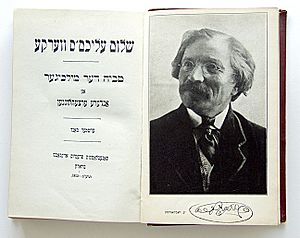
Sholem Aleichem wrote many novels, short stories, and plays. Here are some of his well-known works:
Novels
- Tevye the Dairyman (also known as Tevye's Daughters)
- Motl, Peysi the Cantor's Son
- Wandering Stars
- Menahem-Mendl
Plays
- Hard to Be a Jew
- The Big Lottery
Collections of Stories
- Jewish Children
- The Old Country
- Tevye's Daughters: Collected Stories of Sholom Aleichem
Images for kids
-
A 1959 Soviet Union postage stamp commemorating the centennial of Sholem Aleichem's birth
See also
 In Spanish: Sholem Aleijem para niños
In Spanish: Sholem Aleijem para niños
 | Ernest Everett Just |
 | Mary Jackson |
 | Emmett Chappelle |
 | Marie Maynard Daly |


